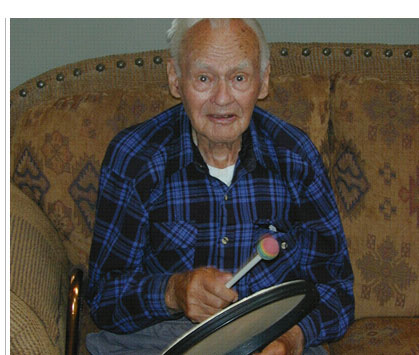
Alzheimer's Disease
Stroke
Parkinson's Disease
Music provides a means of communication when words fail.
Music therapy facilitates positive functioning despite confusion and changes in behavior. In fact, when other things are forgotten, many individuals can recall songs, play familiar or new instruments and move to the rhythm of the music.
Click here for a free consultation on how music therapy can help persons with Alzheimerís Disease.
Music Therapy Provides:
- Memory recall
- Awareness of self and environment
- Decrease in agitation
- Increase in positive mood
- Stress reduction
- Structure for neurological rehabilitation
- Life reflection
- Social interaction
Losing the ability to speak can have devastating effects on the person.
Many individuals have the ability to sing when unable to speak. Succeeding in singing can have tremendous emotional effects and keep the client motivated to continue treatment.
Click here for a free consultation on how neurologic music therapy can help persons suffering from a stroke.
WHAT
Music therapy has the unique potential to facilitate rehabilitation for people who have suffered a stroke. Research-based techniques can improve the individualís speech, motor and cognitive skills.
HOW
By utilizing research-based, neurologic music therapy (NMT) techniques, dramatic improvement can be achieved. Many persons have demonstrated marked improvement in gait (walking) including balance, stride length, symmetry, and rate of speed.
Music therapists employ a variety of specialized neurologic music therapy (NMT) techniques to capitalize on the singing and eventually transition into spoken words.
NMTís also use a variety of techniques to assist in attention, neglect and cognitive rehabilitation.
Music therapists can work with the stroke client individually or in conjunction with other therapies (speech therapists, occupational therapists or physical therapists).
Parkinson's DiseaseNeurologic music therapy has shown dramatic improvements in gait patterns such as speed, symmetry and muscle activation. Specialized techniques address speech issues and there are sustainable improvements in gait recovery over longer periods of time.
Click here for a free consultation on how music therapy an help persons with Parkinsonís Disease.
HOW
Neruologic music therapy techniques have been successfully applied to Parkinsonís patients. Research conducted at the Center for Biomedical Research in Music at Colorado State University has shown the ability to synchronize gait patterns to auditory rhythm. This has resulted in dramatic gait improvements in speed, symmetry, and muscle activation patterns in persons with neruologic disorders such as Parkinsonís disease, stroke and cerebral palsy. In addition, further studies have shown the ability of rhythmic training to produce sustainable improvements in gait recovery over longer periods of time.
Neurologic music therapists can utilize specialized techniques such as Rhythmic Auditory Stimulation (RAS), Patterned Sensory Enhancement (PSE) and Therapeutic Instrumental Music Playing (TIMP) to facilitate gait training, generalized exercise, balance and upper extremity coordination.
Music therapists can work with the Parkinsonís client individually or in conjunction with other therapies (speech therapists, occupational therapists or physical therapists).

